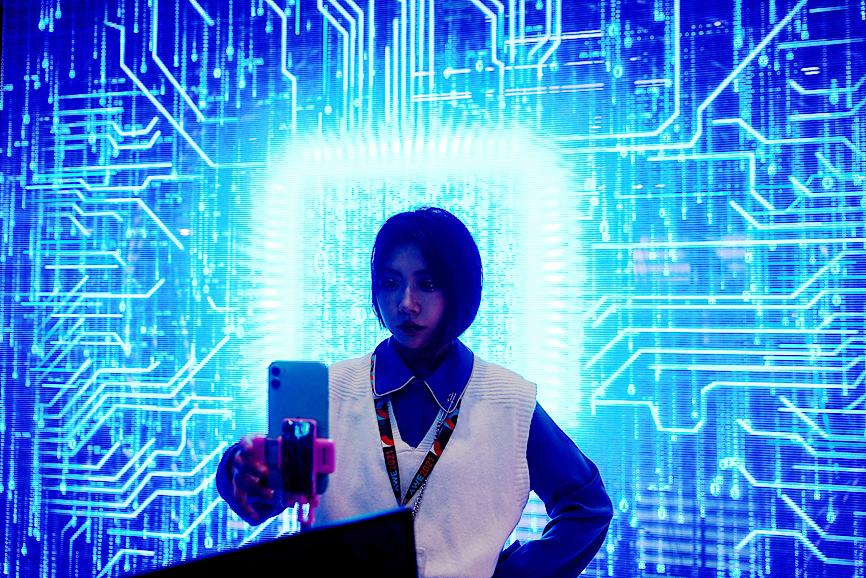US President Joe Biden’s administration on Thursday added seven Chinese supercomputer research labs and manufacturers to a US export blacklist amid a dispute with Beijing over technology and security.
The measure is the latest sign that Biden is sticking to the line taken by former US president Donald Trump toward Chinese tech industries seen by Washington as potential threats.
The decision adds to mounting conflict over the Chinese Communist Party’s (CCP) industrial plans, access to US technology, and accusations of computer attacks and theft of business secrets.

Photo: Reuters
The latest penalties block access to US technology for researchers and manufacturers that the US Department of Commerce said build supercomputers used by the Chinese military in weapons development.
Biden has said he wants better relations with Beijing, but has given no indication that he will roll back sanctions imposed by Trump on Chinese telecom equipment giant Huawei Technologies Co (華為) and other companies.
The CCP has responded by declaring that accelerating efforts to transform China into a self-reliant “technology power” will be this year’s top economic priority.
Chinese-designed supercomputers have set records for speed, but are assembled from processor chips and other hardware made in the US.
They can be used in weapons development by simulating nuclear explosions, and the aerodynamics of high-speed or stealth aircraft and missiles.
The latest US penalties affect the National Supercomputing Centers (國家超級計算中心) in the cities of Jinan, Shenzhen, Wuxi and Zhengzhou; Tianjin Phytium Information Technology Co (天津飛騰信息技術); the Shanghai High-Performance Integrated Circuit Design Center (上海集成電路技術與產業促進中心); and Shenzhen Sunway Micro-electronics Co (深圳信維微電子).
Meanwhile, US telecom regulators are in the process of stripping three Chinese phone carriers of the right to operate in the US.
Trump also tried to force the Chinese owner of video service TikTok to sell its US unit and issued an order barring Americans from investing in securities of companies deemed by the Pentagon to be linked to China’s military.

HANDOVER POLICY: Approving the probe means that the new US administration of Donald Trump is likely to have the option to impose trade restrictions on China US President Joe Biden’s administration is set to initiate a trade investigation into Chinese semiconductors in the coming days as part of a push to reduce reliance on a technology that US officials believe poses national security risks. The probe could result in tariffs or other measures to restrict imports on older-model semiconductors and the products containing them, including medical devices, vehicles, smartphones and weaponry, people familiar with the matter said. The investigation examining so-called foundational chips could take months to conclude, meaning that any reaction to the findings would be left to the discretion of US president-elect Donald Trump’s incoming team. Biden

INVESTMENT: Jun Seki, chief strategy officer for Hon Hai’s EV arm, and his team are currently in talks in France with Renault, Nissan’s 36 percent shareholder Hon Hai Precision Industry Co (鴻海精密), the iPhone maker known as Foxconn Technology Group (富士康科技集團) internationally, is in talks with Nissan Motor Co’s biggest shareholder Renault SA about its willingness to sell its shares in the Japanese automaker, the Central News Agency (CNA) said, citing people it did not identify. Nissan and fellow Japanese automaker, Honda Motor Co, are exploring a merger that would create a rival to Toyota Motor Corp in Japan and better position the combined company to face competitive challenges around the world, people familiar with the matter said on Wednesday. However, one potential spanner in the works is

In a patch of South America rich in lithium, used to make batteries for electric cars and other tech, Bolivia is lagging its neighbors in the race to mine the key metal. An area called the “lithium triangle” which spills over the borders of Bolivia, Chile and Argentina is home to 60 percent of the world’s lithium reserves, according to the US Geological Survey. Bolivia claims to have Earth’s largest deposit of the metal, used to make rechargeable batteries for smartphones, laptops and other devices besides e-vehicles. However, Bolivia has undertaken only four pilot projects and is running just one

HON HAI LURKS: The ‘Nikkei’ reported that Foxconn’s interest in Nissan accelerated the Honda-merger effort out of fears it might be taken over by the Taiwanese firm Nissan Motor Co has become the latest buyout target in Japan as it explores a merger with Honda Motor Co and faces an overture from Hon Hai Precision Industry Co (鴻海精密), known as Foxconn Technology Group (富士康科技集團) internationally. Shares in Nissan yesterday jumped 24 percent, the most on record, to hit the daily limit, after the two Japanese automakers acknowledged that talks are ongoing to better position themselves for competitive challenges during a time of upheaval in the global auto industry. Foxconn — a Taipei-based manufacturer of iPhones, which has been investing heavily in factories to build electric vehicles — has also